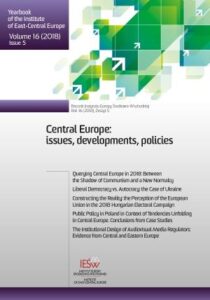ORCID: Artur Adamczyk: 0000-0002-5444-3670
Pages: 147-165
Edition: Lublin 2018
DOI: --
Citation method: Artur Adamczyk, ‘Treaty Revisionism in Turkey’s foreign policy – a threat to the security of Greece and the European Union’, Yearbook of the Institute of East-Central Europe, Vol. 16, No. 4, 2018, pp. 147-165.
Abstract:
Turkey’s current foreign policy is based on the slogans of the revision of the Lausanne Treaty of 1923, which established the external borders of the Turkish state. The revision demands of this treaty are particularly dangerous to the security of Greece and the territorial integrity of this country. Turkey questions the limits of the continental shelf, the exclusive economic zone, the territorial sea and airspace of Greece. Since the mid-1990s, Turkey has also begun to question the Greekness of the Aegean islands. The danger of an outbreak of conflict between Greece and Turkey in the Aegean Sea may lead to the renewal of conflicts in the Balkans and thus to the decreased security of other European Union countries.
Bibliography:
Adamczyk, A., Cypr. Dzieje polityczne [Cyprus. Political history], Warszawa: Dialog, 2002.
Aslan, D. H. and B. Selcuk, ‘Reflections of the Second World War on Turkey’s Foreign Policy’, Kwartalnik Naukowy Uczelni Vistula, vol. 39, no. 1, 2014.
Clogg, R., Historia Grecji nowożytnej [The history of modern Greece], Warszawa: KiW, 2006.
Greek City Time, ‘Greeks outraged by Turkish President’s remarks: “We gave awal the Greek Island”’, Greek City Times, 30 September 2016, https://greekcitytimes.com/greeks-outraged-by-turkish-presidents-remarks-wegave-away-the-greek-islands/ [2018-07-08].
Grigoriadis, I., ‘Turkey’s foreign policy activism: vision continuity and reality checks’, Southeast European and Black Sea Studies, vol. 14, no. 2, 2014.
Gulmez, S. B., ‘Turkish foreign policy as an anomaly: revisionism and irredentism through diplomacy in the 1930s’, British Journal of Middle Eastern Studies, vol. 44, no. 1, 2017.
Inan, Y. and Y. Acer, ‘The Aegean Disputes’, in: A. L. Karaosmanoglou and S. Tashan (eds), The Europeanisation of Turkey’s Security Policy: Prospects and Pitfalls, Ankara: Foreign Policy Institute, 2004.
Kathimerini, ‘Greece complains to NATO over Turkish submarines in Aegean’, Kathimerini, 8 October 2016.
Kathimerini, ‘Turkish subs in Aegean “unacceptable tactic”, Vitsas says’, Kathimerini, 10 October 2016, http://www.ekathimerini.com [2018-07-08].
Kathimerini, ‘Turkish opposition chief challenges Erdogan over Greece visit’, Kathimerini, 12 December 2017, http://www.ekathimerini.com [2018-07-08].
Kathimerini, ‘US stepping in to easy Greece, Turkey tensions’, Kathimerini, 1 March 2017, http://www.ekathimerini.com [2018-07-08].
Koliopoulos, C., ‘From Imperial Backwater to Strategic Minefield: the Mediterranean and the EU’, in: E. Latoszek et al. (eds), European Security and Stability in A Complex Global Order – the Case of Neighbourhood Policy, Warsaw: Dom Wydawniczy Elipsa, 2017.
Koukoudakis, G., The Role of Citizens in the Current Greek-Turkish Rapprochement, Paper for the 56th Annual Conference of Political Studies Association, April 4-6, 2006, http://www.gpsg.org.uk/wp-content/uploads/2014/06/2006-P3-Koukoudakis.pdf [2018-07-03].
Kouskouvelis, I. I., ‘Turkey, Past and Future. The Problem with Turkey’s “Zero Problems”’, Middle East Quarterly, vol. 20, no. 1, Winter 2013.
Landau, J. M., ‘The Ups and Downs of Irredentism: The Case of Turkey’, in: N. Chazan (ed.), Irredentism and International Politics, Boulder: Lynne Rienner, 1991.
Misztal, M., Historia Cypru [History of Cyprus], Kraków: Wydawnictwo Naukowe Uniwersytetu Pedagogicznego, 2013.
Nomikos, J. M., ‘Illegal Immigration and Organized Crime in Greece’, RIEAS Research Paper, no. 144, 2010.
Osiewicz, P., Konflikt cypryjski [Cyprus conflict], Warszawa: Wydawnictwo Naukowe PWN, 2013.
Osmańczyk, E., Encyklopedia ONZ i stosunków międzynarodowych [Encyclopedia of the UN and international relations], Warszawa: Wiedza Powszechna, 1986.
Papuççular, H., ‘Fragile Balances: Turkish Foreign Policy on the Sovereignty of the Dodecanese Islands (1940-1947)’, Journal of Balkan and Near Eastern Studies, vol. 20, no. 5, 2018.
Paszkiewicz, J., ‘Uwarunkowania geopolityczne bałkańskiej polityki Turcji w latach 20. i 30. XX wieku’ [Geopolitical conditions of Turkey’s Balkan politics in the 1920s and 1930s], Balcanica Posnaniensia, vol. XXI, 2014.
Paulenoff, A., ‘The Aegean Sea Continetal Shelf Dispute: Greek and Turkish Interpretations’, Perspectives on Global Issues, Spring 2009.
Pedi, R., ‘Greece in the Aftermath of the Economic Crisis Needs to Change Its Strategy in the International System: Choosing Between Melians and David’, in: J. Marangos (ed.), The Internal Impact and External Influence of the Greek Financial Crisis, London: Palgrave Macmillan, 2017.
Stępniewski, T., Geopolityka Morza Czarnego w postzimnowojennym świecie [Geopolitics of the Black Sea in the post-Cold war world], Lublin and Warszawa: IEŚW, 2011.
Stobiecki, R., ‘Różne oblicza historycznego rewizjonizmu’ [Different faces of historical revisionism], Sensus Historiae, vol. XIX, no. 2, 2015.
The Guardian, ‘Turkey claims Afrin city centre is under “total” control’, The Guardian, 18 March 2018, https://www.theguardian.com/world/2018/mar/18/turkey-claims-afrin-city-centre-under-total-control-syria[2018-07-08].
The New York Times, ‘Erdogan, on Landmark Visit to Greece, Sets Diplomacy Aside’, The New York Times, 7 December 2017, https://www.nytimes.com/2017/12/07/world/europe/erdogan-greece-turkey-visit.html [2018-07-08].
Treaty of Lausanne, https://wwi.lib.byu.edu/index.php/Treaty_of_Lausanne.
‘Turkey and Greece: Time to Settle the Aegean Dispute’, Europe Briefing no. 64, International Crisis Group Working to Prevent Conflict Worldwide,
Istanbul, Athens, Brussels, 19 July 2011, https://www.crisisgroup.org/europe-central-asia/western-europemediterranean/turkey/turkey-andgreece-time-settle-aegean-dispute [2018-07-24].
Turkey using Greek soldiers as “bargaining chips”, http://www.euronews.com/2018/04/22/turkey-using-greek-soldiers-as-bargainingchips-[2018-07-08].
Tuysuzoglu, G., ‘Strategic Depth: A Neo-Ottomanist Interpretation of Turkish Euroasianism’, Mediterranean Quarterly, Spring 2014.
Uzer, U., ‘The Revival of Ottomanism in Turkish Foreign Policy: “The World Is Greater than Five”’, Turkish Policy Quarterly, vol. 16, no. 4, 2018.
Visvizi, A., Greece, The Greeks, and the Crisis: Reaching Beyond “That’s how it goes”, Carnegie Council for Ethics in International Affairs, September 2016, https://www.carnegiecouncil.org/publications/articles_papers_reports/787 [2018-07-12].
Yesilyurt, N. and A. Akdevelioglu, ‘Turkey’s Middle East Policy under the JDP Rule’, The Turkish Yearbook of International Relations, vol. 40, 2009.

PDF: Download